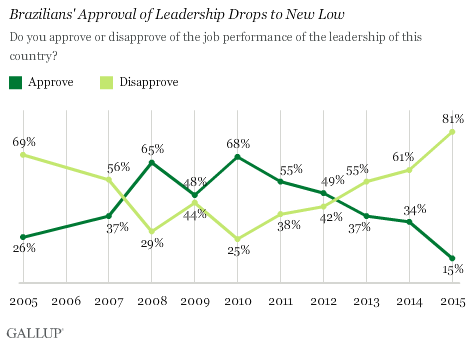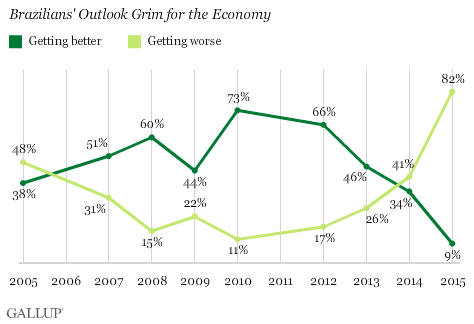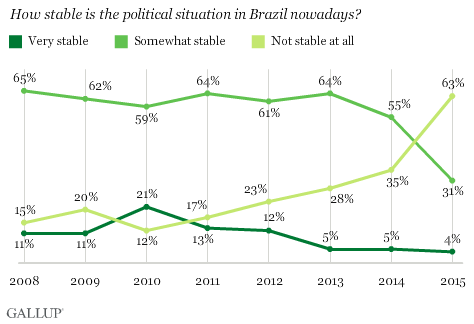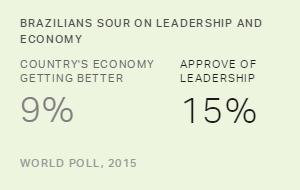Story Highlights
- 15% of Brazilians approve of country's leadership
- Perceived corruption in government is highest in decade, at 78%
- Record-low 9% see the economy getting better
WASHINGTON, D.C. -- As Brazilian President Dilma Rousseff faces possible impeachment, Brazilians' faith in their leadership is at a new low. Just 15% of Brazilians approve of the job performance of the leadership of the country, which -- on top of political scandal -- has struggled with social unrest and its worst recession in decades.

Rousseff's chances of impeachment increased last week after the country's largest party, the Brazilian Democratic Movement Party, pulled out of her coalition government. The move isolates her politically as she faces allegations of improperly using money from state banks to cover budget shortfalls. She also is facing scrutiny for attempting to appoint former President Luiz Inacio Lula da Silva to be her chief of staff. Silva is among dozens of political and business figures implicated in a corruption probe related to state-run oil company Petrobras.
The president's popularity has plummeted amid a second term plagued by long-running corruption scandals and the longest economic downturn since the 1930s. A majority of Brazilians have perceived corruption as widespread in their government for years, but as the scandal fully came to light in 2015, it hit a record-high 78%. Brazilians' outlook for their economy tanked at the same time, with the percentage saying it was getting better dropping to a record-low 9%. Brazilians' frustrations have spilled out into massive anti-government street protests.

Many analysts are uncertain as to how Rousseff's potential impeachment would affect the country's economy and political situation, but most Brazilians already believe there is no stability in the current situation. After years of relative stability, the majority (63%) now say the country's political situation is not stable at all.

Bottom Line
While corruption scandals are hardly a new phenomenon in Brazil (or in Latin American politics, for that matter), the unfolding Brazilian crisis could signal a new era in the region's institutional development and political culture. Events in the past year have shaken the region's political establishment, with iconic populist regimes and once-popular political figures falling -- or losing ground -- rather dramatically. As recently as September 2015, Guatemala's President Otto Perez Molina resigned and was jailed amid a corruption scandal. Shortly after, the populist regimes in Argentina and Venezuela faced resounding defeats in presidential and legislative elections, respectively, and within two months, Bolivian President Evo Morales lost a referendum that would have allowed him to run for a fourth term in office.
Brazil's legislators and Supreme Court will soon decide Rousseff's fate, and she's pulling strings to gain some much-needed political support as she launches her defense. Regardless of the outcome, it adds to Latin America's recent political drama.
It is unclear whether this regional trend is a sign of political and institutional maturity or just a popular reaction to the "perfect storm" of plummeting commodity prices, failed fiscal policy, rampant corruption and chronic crime issues. Political change that occurs when countries uphold the rule of law and fight corrupt practices and political hegemony is certainly a rarity worth noting and monitoring in Latin America.
Johanna Godoy contributed to this article.
Survey Methods
Results are based on face-to-face interviews with 1,000 adults in Brazil, aged 15 and older, each year. The most recent survey was conducted from October to November 2015. For results based on the total sample of national adults, the margin of sampling error is ±3.5 percentage points. The margin of error reflects the influence of data weighting. In addition to sampling error, question wording and practical difficulties in conducting surveys can introduce error or bias into the findings of public opinion polls.
For more complete methodology and specific survey dates, please review Gallup's Country Data Set details.
Learn more about how the Gallup World Poll works.

